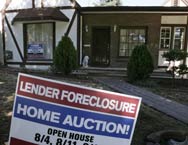
Time for a fresh start
More than 2.2 MILLION foreclosure documents were sent out to US homeowners last year, forcing many to consider living off-grid, in cabins, RVs, on backlots or trailer parks. .
In a ground-breaking story Off-Grid interviewed one early victim of this trend about her inspirational journey through financial collapse to off-grid happiness(see “on the ropes and off the grid” below). While sad that she and her husband lost everything, it fills us with hope that through her financial downfall she discovered that what matters in this world is not material possessions but a sense of freedom and fulfillment.
With 1.28 million properties under threat in the US according to RealtyTrac, the Federal Bureau of Investigation is investigating 14 companies for possible accounting fraud and insider trading offences related to subprime mortgages.
Rick Sharga, vice-president of marketing at RealtyTrac, said about half of those hit by repossession proceedings generally succeeded in wriggling out and managing to keep their homes, while the rest were forced to leave.
Many homeowners run into trouble when short-term “teaser” interest rates expire and they face a large increase in repayments. Those who try to sell their homes are struggling as liquidity problems at banks have created a credit crunch, making it hard for potential purchasers to get mortgages.
“The people who are having the hardest time getting loans are first-time buyers because they have no home to use as collateral,” said Sharga. “If you make it difficult for them to enter, it creates a ripple effect going all the way up through the market.”
He held out little expectation of an upturn until the latter half of 2008: “Towards the end of the year, we believe that, if everything else stays consistent, we should start to see some relief.”
The development, another sign of fallout from the subprime mortgage crisis, comes as light regulation of the industry � in particular mortgage brokers � has been blamed for mis-selling and abuse of mortgage products.
Bill Carter, an FBI spokesman, said the agency had been working �very closely� with the SEC, with some of the latest investigations moving �in parallel�. He declined to name the companies involved.
The number of mortgage fraud cases opened by the FBI jumped to 1,210 in fiscal 2007 from 436 in fiscal 2003, the agency said.
In a report out last year, the FBI classified mortgage fraud into two broad areas. The first is fraud for property, involving �minor misrepresentations� by a mortgage applicant for the purpose of buying a property as a primary residence.
The second category � of most concern to the FBI and the mortgage industry � is �fraud for profit�. This often involves multiple loans and �elaborate schemes perpetrated to gain illicit proceeds from property sales�, the FBI report said.
It said such schemes usually involved �gross misrepresentations concerning appraisals and loan documents�.
The most common form of mortgage fraud is �illegal property flipping�, which involves false appraisals and other fraudulent loan documents.
Some of the SEC�s investigations are related to potential insider-trading, focusing on wider-than-expected writedowns unveiled recently by some large Wall Street banks. The way credit rating agencies rated the securities into which mortgages were repackaged is part of the effort.
The total number of American homes threatened by bailiffs was up by three-quarters on 2006. The worst hit state was Nevada, where one in 29 homes entered foreclosure during the year, followed by Florida and Michigan.